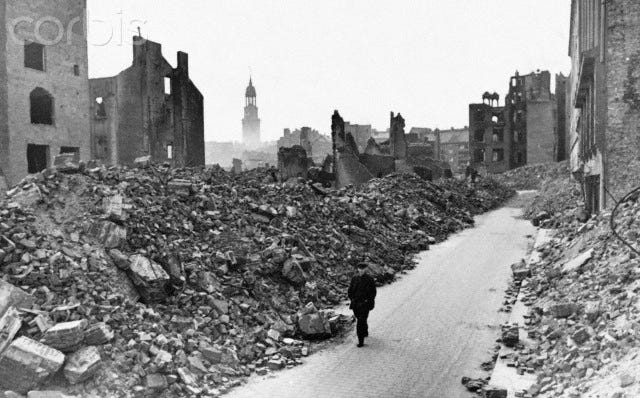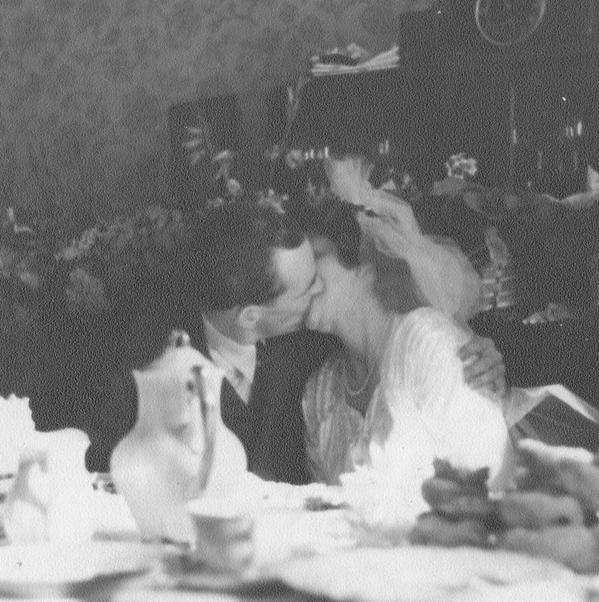"Last year, you could still smell the stench from decaying bodies trapped underneath the city’s wreckage."
There are no working-class memoirs about being part of Britain's occupation force in Germany's second-largest city Hamburg, apart from my dad's Love Among the Ruins. It's a brilliant read about life observed from the lower ranks when hope was reborn from the ashes of war.
The creators of much of our literary, journalistic and cinematic popular culture are from the upper middle class or society’s entitled set. They have moulded a myth about Britain during the Second World War that was cast from their privileged position in society. The working class are archetypical and a backdrop, used for comedy, whinging, dead bodies or examples of a Tommy who learns through battle that democracy is worth fighting for.
My dad, who was from the lower rungs of the working class didn't experience war like someone from the middle class. He didn't hate Britain. But he did detest the people who owned it and those that managed it for them.
My father’s experiences in the Second World War were not about being patriotic or dutiful. They were about surviving it and returning to a peacetime that included the construction of a modern Welfare State. It’s evident that the reason why our working class history during the Second World War was rewritten by popular culture is to keep us obedient in an increasingly unequal and authoritarian society governed for the benefit of its top income earners.
When August came, the residents of Hamburg sweltered within the skeleton of their defeated city.
Record temperatures scorched the northern hemisphere and the city’s ruins were bleached white by the sun. While at night a crisp desolate breeze floated in from the Baltic.
In the dwindling days of summer, Hiroshima and Nagasaki were incinerated by atomic explosions that ended the Second World War in the Pacific. All nations were now at peace with their fellow man. In Germany, it certainly didn’t feel like civilisation was in harmony with itself.
Europe was divided between the Soviet army and the Allied forces in an uneasy détente. Anarchy and hunger threatened Western Europe. Political grievances, black-market turf wars, and old scores against collaborators were settled at midnight with a loaded revolver.
Peace in Europe was as uncomfortable as a suit too small on the shoulders.
While the puppet masters – the banks, the politicians and the generals – pulled strings behind the scenes and shifted the continent politically and financially, I was being tugged deeper into Friede’s world. I orbited her like a faithful satellite, while she tentatively introduced my good character and name to her close girlfriends.
She smuggled me into their conversations and inflated my generosity and kind nature. ‘Look what he brought my family, a whole kilo of cheese.
He even found tooth powder to clean my teeth. This Tommy always tries to converse in German, even when he mixes up the words.’
Among her friends, I was becoming known as the Brit who wasn’t looking for a quick shag underneath the Linden trees.
At the beginning of our courtship, I was left to linger in the background. Friede kept me ignorant and oblivious to most of her everyday world. She was still uncertain about the depth or distance our friendship would travel. Friede purposely kept me apart from her friends.
She feared they might reveal confidences about her life or disapprove of her dating a foreign occupier.
In late August, I was introduced to her friend Gerda. The two had been friends since early childhood and it was an alliance built upon trust and protection. Gerda was the first friend Friede made when she was sent to live with her foster parents in Hamburg’s working-class district of Altona.
Both girls lived in the same apartment block and from the day they met, Gerda acted as her bodyguard against gossips and bullies.
Friede’s friend was a peroxide blonde who was physically pretty and emotionally and intellectually uncomplicated.
Past or future tense meant little to Gerda because she lived without introspection. To her, one day you were born and many years later you died. It was the in-between living that mattered to her.
I took them out for coffee at a riverbank café in the Blankenese district. It was an area popular with occupying forces because its restaurants still functioned with pre-war efficiency.
An old and shuffling maître d’ brought us to our table. Friede remarked that the café had been in business since the days of the Kaiser.
‘When I was about ten, my mother and her boyfriend Henry brought me here. It was filled with stuffy Nazis. The uniforms are different, but the cakes remain the same.’
It was a beautiful outdoor restaurant for a well-to-do crowd. Money, not ideology, was its political stripe. That was why it survived the Kaiser’s abdication, the assassination of democracy, and Hitler’s bloody end. Regardless of who was in power, the menu at the café remained the same: Vienna coffee, Sacher torte, and VSOP brandy. The café welcomed occupation as it did every historical event: with a cash-only policy.
It was a warm, cloudless day and the restaurant tables were crowded with loud British troops and female companions. It looked like there was an equal portion of officers and enlisted men chatting and flirting with young German women.
Although the occupation command frowned upon fraternisation, it was almost impossible to enforce.
The occupiers were young men who had endured five years of war. So, irrespective of HQ’s fear that contact with the civilian population would lead to an outbreak of venereal disease, corruption in the ranks, and a
diminished capacity to keep order in Germany, nothing was ever really done to implement the regulation.
The atmosphere at the café was as carefree as if it were a summer’s day before the war. But that was because everyone was facing the river. No one dared turn towards Hamburg’s skyline, where it was Gomorrah, the day after Lot had packed up and left.
Hamburg was no more than a putrefying animal body where maggots and carrion fed off its carcass. Underneath the city’s mountains of ash, cement, bricks, and burned beams were the mummified corpses of some 30,000 bombing victims. They had perished during the RAF firebombing raids in July 1943.
‘Last year, you could still smell it,’ Friede noted while she put on fashionable sunglasses and got comfortable in her chair.
‘Smell what?’ I asked, while her friend Gerda looked out towards the river, uninterested.
‘The stench from decaying bodies trapped underneath the city’s wreckage,’ she replied. ‘Last summer, you needed to place a handkerchief sprinkled with eau de cologne against your face to stop the odour of rotting flesh from getting into your nostrils. It was overpowering. Even in the winter of 1944. How do you say, the taste, is that the right
word? The taste of death overpowered winter’s frigidness.
Hamburg is a tomb,’ she concluded morbidly.
The waiter arrived and set down our order at the table.
Your support in keeping my dad’s legacy and me alive is greatly appreciated. So if you can please subscribe because it literally helps pay my rent. But if you can’t it is all good because we are fellow travellers in penury.
The fight to keep going was made worse- thanks to getting cancer along with lung disease and other co- morbidities which makes life more difficult to combat in these cost of living crisis times. So if you can join with a paid subscription which is just 3.50 a month or a yearly subscription or a gift subscription. I am offering a 20% reduction in a yearly subscription to ensure my prescriptions can be purchased today. One new subscriber covers that cost. I promise the content is good, relevant and thoughtful. But if you can’t it all good too because I appreciate we are in the same boat. Take Care, John





Besides the brilliant observations about the inherent misery of war I am always fascinated to read about Hamburg from your dad's perspective. I am currently living in Hamburg and both the differences (sure, I knew that Altona started as working class, however it has a very different population now) and the things that never change (the summer days' run to the expensive cafes in Blankenese) make me reflect on how the face of a place can change both with macro-events like the war and with the littlest, subtlest changes brought about by so many individuals...and of course it's beautiful to read about the budding love between your parents.
illuminating